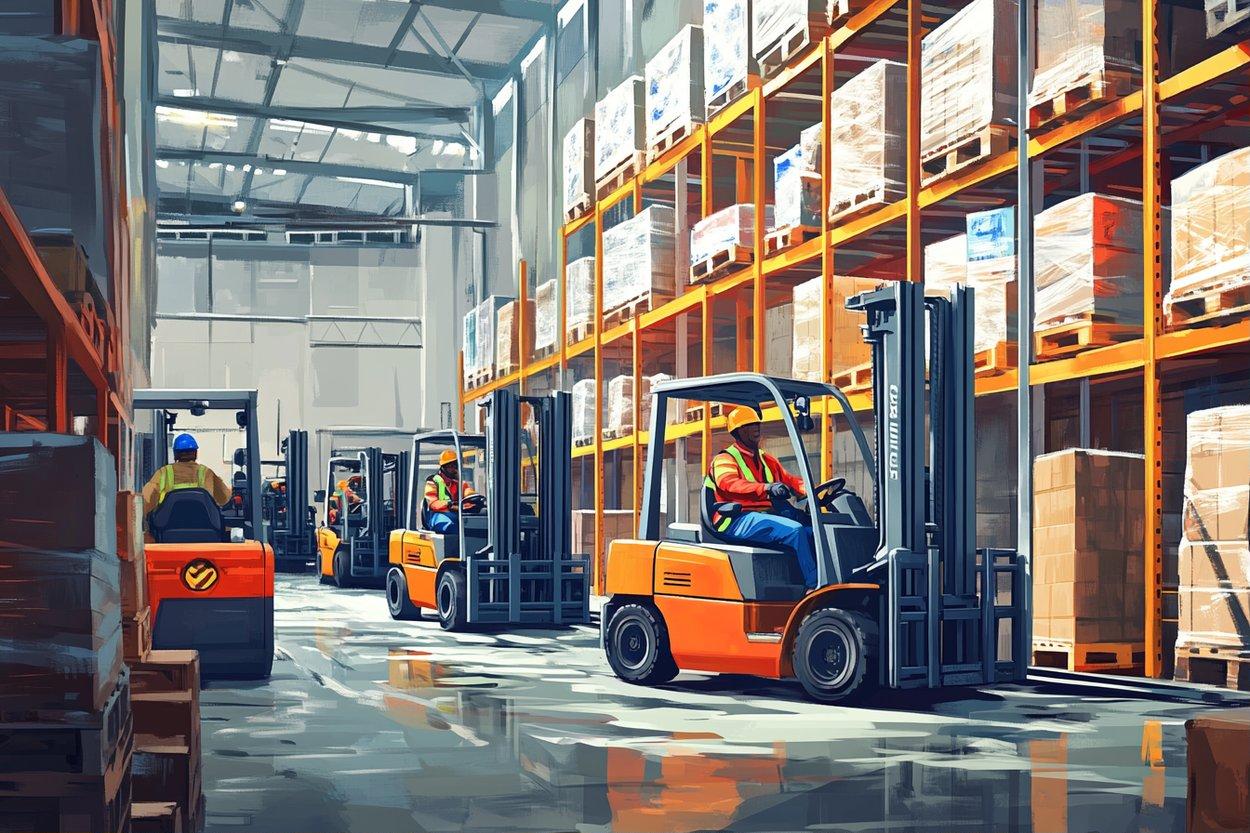Careers with Forklift Companies in the UK
The materials handling and logistics sectors in the UK rely heavily on skilled forklift operators to maintain efficient warehouse operations. With over 400,000 forklift trucks in operation across British warehouses and distribution centers, careers in this field offer stability and growth potential. The forklift industry encompasses various roles beyond just driving, including maintenance technicians, trainers, and supervisors, creating diverse career paths within the sector.

What Forklift Drivers Do Each Day
Forklift operators perform essential functions that keep warehouse operations running smoothly. Their daily responsibilities typically include loading and unloading delivery vehicles, transporting palletized goods to designated storage locations, retrieving stock for order fulfillment, and organizing inventory within the facility. Many drivers also conduct pre-shift equipment inspections, checking for mechanical issues and ensuring safety features function properly.
Record-keeping forms another crucial aspect of the role, with operators logging goods movements, maintaining inventory records, and documenting any discrepancies or damages. In modern warehouses, this often involves using digital systems and handheld devices to scan barcodes and update stock levels. Forklift drivers must also maintain their work areas, ensuring aisles remain clear of obstructions and addressing any spillages promptly.
The work environment varies significantly depending on the industry. While many operators work in temperature-controlled warehouses, others may operate in challenging conditions such as cold storage facilities, outdoor yards, or manufacturing plants with specific hazards requiring additional safety protocols.
Why Forklift Companies Are Recruiting More Staff
The materials handling sector is experiencing significant workforce demand due to several converging factors. E-commerce growth has revolutionized retail distribution networks, requiring more extensive warehouse operations and thus more qualified operators. The COVID-19 pandemic accelerated online shopping trends, further increasing pressure on logistics infrastructure.
Brexit has also impacted the available workforce, with many European workers previously employed in warehousing having returned to their home countries. This demographic shift has created opportunities for UK residents to enter the field. Additionally, an aging workforce means many experienced operators are approaching retirement, creating a skills gap that companies are eager to address.
Seasonal fluctuations continue to drive recruitment, with retailers and distribution centers requiring additional staff during peak periods like the pre-Christmas rush or major sales events. Many companies now maintain relationships with training providers to ensure a steady pipeline of qualified candidates to meet these varying demand levels.
Technological evolution within warehousing has also created demand for operators with digital skills who can work with automated systems and computerized inventory management. Rather than reducing jobs, warehouse automation has often changed their nature, requiring operators who can interface effectively with technology.
Skills and Training Employers Expect
Employers in the forklift sector look for both technical abilities and personal attributes. The foundational qualification is a forklift operator license, which requires completing accredited training through bodies such as RTITB (Road Transport Industry Training Board), ITSSAR (Independent Training Standards Scheme and Register), or AITT (Association of Industrial Truck Trainers).
Training typically involves both theoretical and practical components. The theoretical portion covers safety regulations, pre-operational checks, load assessment, and hazard awareness. Practical training focuses on vehicle control, maneuvering in confined spaces, stacking and retrieval techniques, and specialized operations relevant to specific truck types.
Beyond certification, employers value soft skills including spatial awareness, concentration, attention to detail, and the ability to follow precise instructions. Physical capabilities matter too—operators need reasonable fitness levels, good eyesight, and coordination. Communication skills are increasingly important as warehouse operations become more integrated with other business functions.
Most entry-level positions require a minimum of a basic operator license, though some employers may provide this training for promising candidates. Career progression typically depends on acquiring additional qualifications for different forklift types (counterbalance, reach, narrow aisle, etc.) or complementary certifications in areas like dangerous goods handling or advanced load management.
Salary and Benefits in Forklift Careers
Compensation for forklift operators varies based on experience, location, shift patterns, and industry sector. Entry-level operators typically earn between £20,000 and £22,000 annually for standard daytime shifts. Those with specialized qualifications or working in high-demand sectors like pharmaceutical distribution or hazardous materials handling can command higher salaries, often reaching £25,000-£28,000.
Shift premiums significantly impact earnings, with night and weekend work often paying 15-25% above standard rates. Many companies offer overtime opportunities, particularly during peak seasons, allowing operators to increase their income substantially.
| Position Level | Experience | Typical Annual Salary | Additional Benefits |
|---|---|---|---|
| Entry-Level Operator | 0-1 years | £20,000-£22,000 | Basic pension, statutory leave |
| Experienced Operator | 2-5 years | £22,000-£25,000 | Enhanced pension, additional leave days |
| Multi-skilled Operator | 5+ years | £25,000-£28,000 | Bonus schemes, health benefits |
| Team Leader/Supervisor | 5+ years + management skills | £28,000-£32,000 | Management bonuses, career development |
Prices, rates, or cost estimates mentioned in this article are based on the latest available information but may change over time. Independent research is advised before making financial decisions.
Benefits packages vary considerably between employers. Larger logistics companies typically offer comprehensive benefits including pension schemes, health insurance, and employee discount programs. Smaller operations may offer fewer formal benefits but potentially provide more flexible working arrangements or advancement opportunities.
Career Progression Opportunities
The forklift sector offers multiple career advancement paths. Many operators progress to team leader or supervisor roles, overseeing operations and managing small teams. With additional qualifications and experience, progression to warehouse management positions is possible.
Some operators transition into specialized roles such as training instructors, earning significantly higher wages by teaching new operators. Others move into technical positions such as fleet maintenance, particularly those with mechanical aptitude who complete additional technical training.
The skills developed in forklift operations—inventory management, spatial organization, safety awareness, and logistics knowledge—also transfer well to other areas within supply chain management. Many former operators find opportunities in inventory control, dispatch coordination, or quality assurance roles.
The logistics industry continues to evolve with technological advancements and changing consumer expectations. For those willing to continuously develop their skills, forklift operation can serve as either a stable long-term career or a stepping stone to broader opportunities within the materials handling and supply chain sectors.




